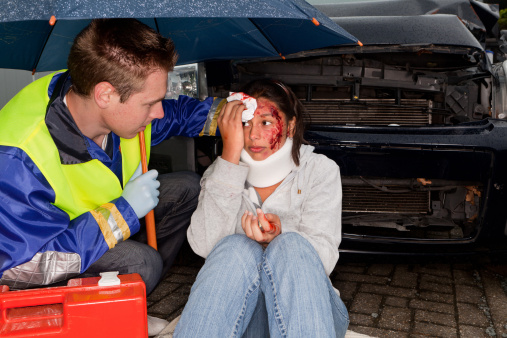When you’ve been involved in a car accident, there are fundamental things that have to be considered. Each and every action you take after the accident can either strengthen or weaken your potential claim if you feel there is a party at fault. However, there are some basic steps everyone that is involved in an accident can follow to make sure that they receive full compensations for damages and injuries. Here’s are the steps everybody should complete following an accident:
Call 911 and Seek Medical Attention
After any type of car accident, you should first and foremost get in touch with the nearest police department. Once everything has settled, get a copy of the police report. You can either get in touch with the involved police department or even order your copy online.
It’s very important to seek immediate medical attention for any injuries you may have sustained in the crash. Be sure to tell your attending medical of any pain, however minor, that you may be feeling at the time. Quite often, major injuries don’t show symptoms early on, making it harder to link them with the accident if there is no thorough documentation. Be sure to report any symptoms including:
- Dizziness
- Ringing in your ears
- Headaches
- Blurred vision
- Temporally problems with concentration or memory
- Emotional changes
Document the Car Crash
It is critical that you obtain contact information from every passenger involved in the accident and witnesses. Some of the details you should seek out include names, phone numbers, addresses, license plates and insurance company information. If injuries are making it harder to gather information, friends and family can step in to help an injured victim at the accident scene. The information gathered will be of extreme importance when comes the time to build your case.
Remember the police can make mistakes when it comes to determining who is at fault for the accident. A lawyer will often help you when it comes to investigating the accident as well as help protect your rights. In addition, your lawyer will help with the identification of the cause and circumstances of the accident before any critical evidence is destroyed or lost.
Document Personal Injuries Related to the Car Accident
Make sure you do not miss any of your medical appointments. In most cases, failing to attend a doctor’s appointment is an indicator that the victim is not experiencing any pain, according to insurance adjusters. In addition, keep good records regarding:
- All doctor’s visits including x-rays, medical documents, treatments, hospital visits, laboratory services, over-the-counter medications, prescriptions and physical therapy
- Maintain notes on every service provided plus amount charged
- A diary of everyday pain, emotional distress, tenderness, etc.
- Record of the impact the injuries have had on your relationships and daily life
- Photographs of all injuries sustained, preferably immediately after the accident
- Copies of documents like medical records and bills
Avoid Discussing the Incident
As much as possible, keep any discussion about the accident between yourself, the police, your insurance company and your lawyer. Representatives of the other insurance company should get the nod from your insurer or lawyer first. Decline any talks with the other insurance company and have them call your insurer or lawyer instead to arrange the interview.
Decline Early Settlement Offers
Be wary if the other insurance company offers you a settlement. While some injuries are immediately noticeable, there are others that may appear weeks or even months later. Do not attempt to settle your claim until you receive assurance that all your injuries will be compensated, and talk with your lawyer before signing on the dotted line.
The best thing you can do to support your case is to consult an experienced auto accident lawyer. A lawyer will be in a better position to get you the maximum possible recovery in case of injuries.
